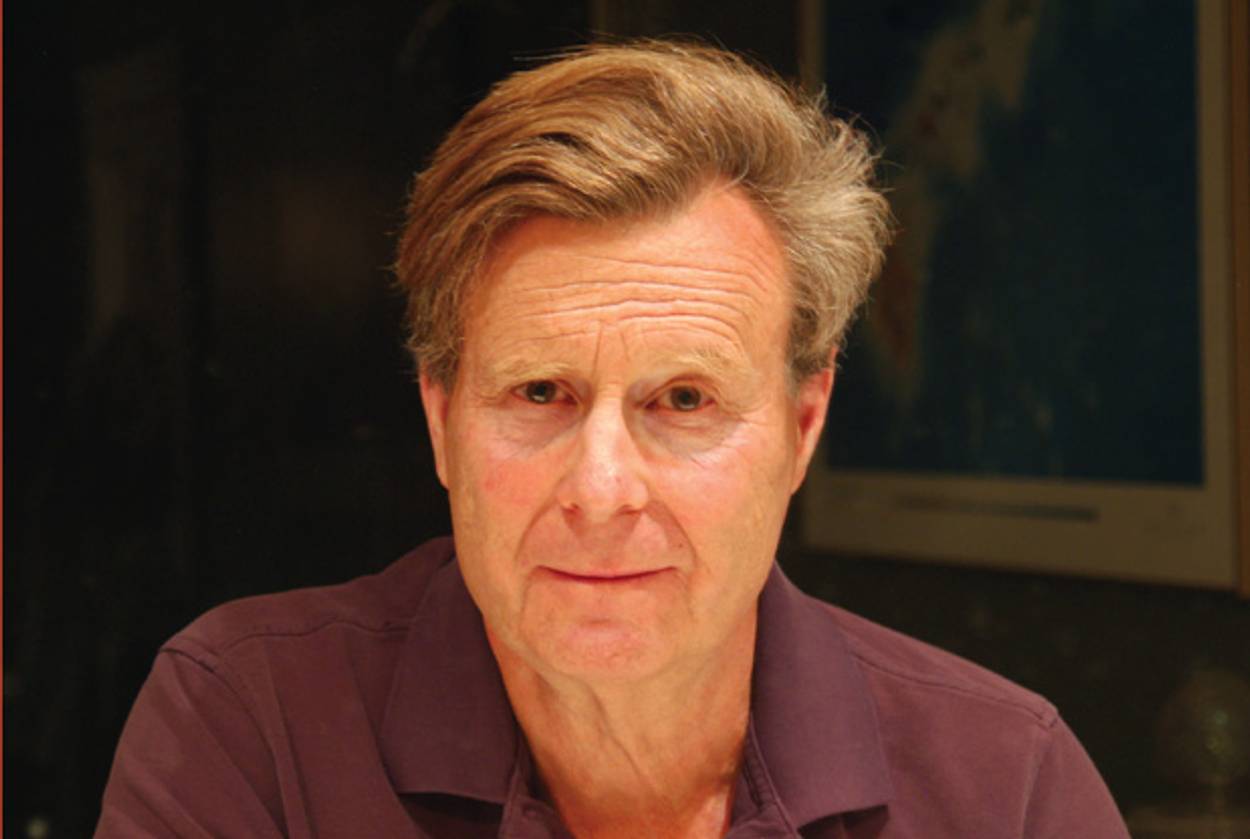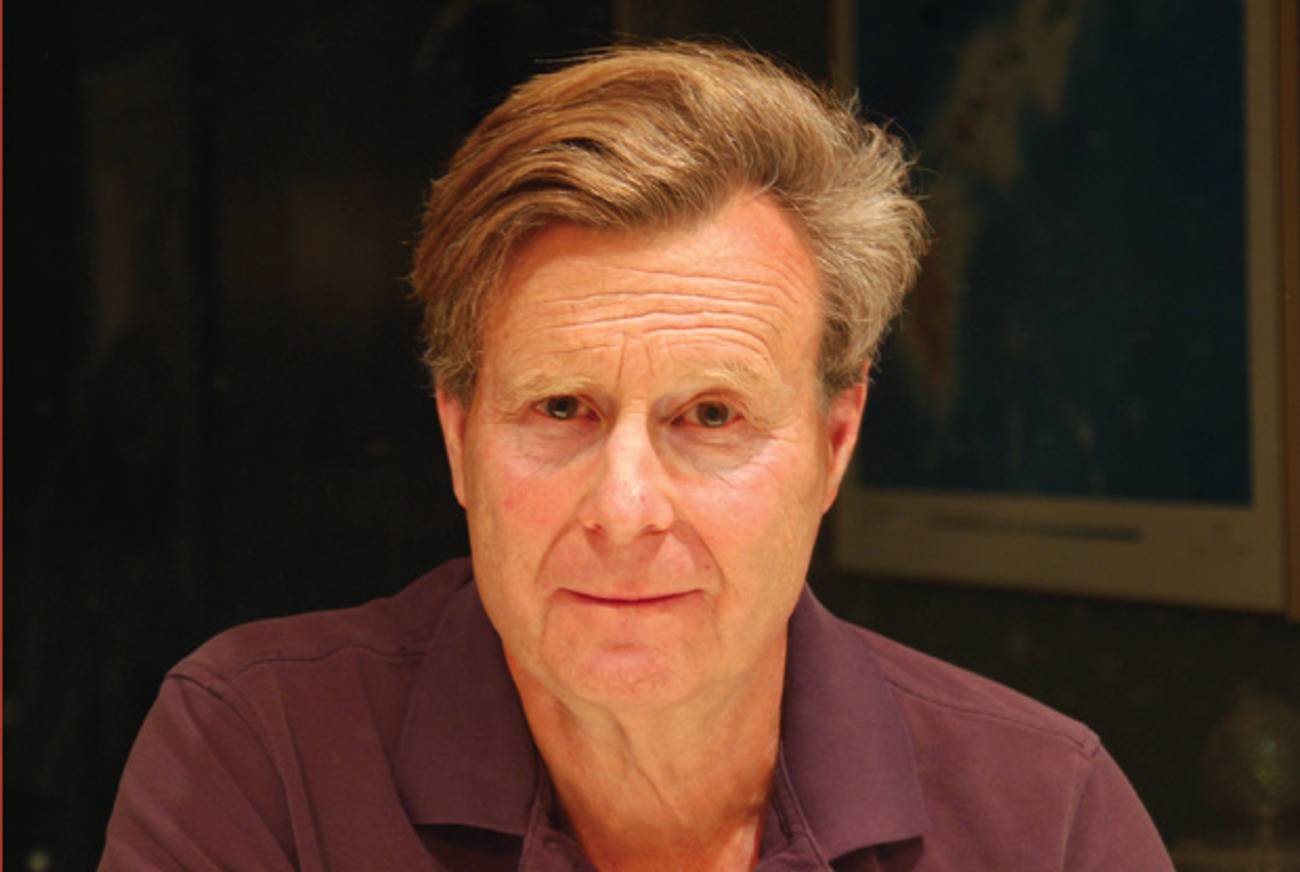Mark Helprin’s Tale
The author, like Israel, takes risks—and lives in opposition to nebbishy Jewish New Yorkers




“I was waiting by the crematory oven,” Mark Helprin told me, realizing that the hostess had neglected to lead him to my table at a dimly lit, half-Le Corbusier, half-IKEA styled restaurant Helprin’s publicist had reserved. “That very trendy-looking, in-wall oven? It’s a crematory oven.” He paused for a moment, and spoke again, “Hipness, at its base, is either stupid or cruel. That’s a general rule.”
Helprin, the author of, among other novels, the neo-classic New York story Winter’s Tale, is one of America’s most accomplished yet at the same time oddly neglected Jewish writers and public intellectuals. His most recent work, In Sunlight and in Shadow, a novel set in 1947 about a character named Harry Copeland, was released late last month. We met for an early breakfast in the lobby of The Gansevoort hotel, which Helprin almost regretfully explained offered its guests lubricants, condoms, and every variety of soft-core pornography where a minibar should be. Helprin looked more like an academic than an artist—he wore the standard, spartan professor’s navy blazer, and put his bag down on the table as though he were about to start a lecture.
Brevity isn’t exactly Helprin’s trademark; much like his 1983 novel, Winter’s Tale, his newest work is an intimidating 700 pages. “I don’t really even think about it,” he said. “When you’re young it seems impossible to write at length. As you get older it seems impossible to write not at length.” Given that he published Winter’s Tale nearly three decades ago, it seems simpler and more accurate to conclude that Helprin writes long.
Helprin’s robust style, however, represents an equally large and grand ambition; In Sunlight and in Shadow was a novel written in the form of a Romance. “What we’re talking about has nothing to do with Romanticism, nothing to do with romance, which is just a love story, but the ancient form of Romance, which goes back 5,000 years,” he began to clarify. This original, ancient form tells the story of a character who leaves home, perhaps to war, fights a monster—make a “rite de passage,” Helprin emphasized in a muted but confident French accent—and finally returns home, finds a woman, and starts a new generation. Romance has a tremendous literary significance for Helprin, whose conception of Western literature revolves around this form that he believes is coded into storytellers as an inexorable component of their craft. More than that, storytellers need Romance to live; they are completed by it. His main character, Harry Copeland—a war veteran returned to New York—falls perfectly into the mold of a Romantic hero.
As it turns out, Copeland, the inheritor of a leather-goods manufacturing company, is based on Helprin’s own father, who worked in the film industry and produced movies such as The Third Man and The Red Shoes. The character isn’t the typical New York Jew: He’s 6 feet tall, broad, dark, an ex-soldier, and a Clark Gable look-alike. “People think of us as nebbishes,” Helprin explained, but “[my father] was essentially a commando.” Helprin doesn’t give credence to neurotically timid Jewish characters and noted that in Czarist Russia Jewish males were drafted at age 5; he mentioned this fact almost as though it was something he thought American Jews needed to keep in mind.
Both Helprin and Harry Copeland seem to live in opposition to the rather large nebbishy population that seems to exist among Jewish New Yorkers. When he mentioned that he served in the Israeli Defense Forces—“Tzahal for you and me,” he said, waving his finger between us—and was in Israel in 1967, and 1973, I was intimidated, not only because I was speaking to one of the most accomplished contemporary authors in America, but because I was meeting with a person who had been trained to kill an enemy with his hands. “Bagel!” he shouted, picking up his Nova sandwich, putting me at ease.
In addition to his successful literary career, Helprin has had a famous—or infamous—political identity, not only as an active conservative Republican, which, according to Helprin lost him a spot in Princeton’s anthology of Jewish-American letters. He spent many years working as a political speechwriter, most notably for Bob Dole. “I was very close to him throughout the campaign. I was right, right up there all the time,” Helprin told me, imitating Dole’s voice on occasion, shaking his arms in the air to give me the full effect.
But to call Helprin a career speechwriter would be entirely inaccurate. That is because he didn’t accept any payment—ever—for his speechwriting, despite an allegation that he was given over $10,000 to write Bob Dole’s resignation speech from the Senate—the one Norman Podoretz called the greatest political speech of the last 50 years. Helprin saw speechwriting as more of a civic duty, a political activity demanded of him, and knew that being paid for his work would compromise him. “I wanted to help him win. He needed help, a lot of it.” Helprin’s political inclination is almost that simple: He wrote speeches, and many incredibly influential speeches (although he wouldn’t tell me for whom) not as a career venture, but instead so that any candidate with similar political views would get the help they needed.
Helprin also saw Dole as a vehicle for his own ambitions to transcend the surly bonds of earth: “What I had in mind was, if he had won, to go to him and say, ‘Mr. President, there’s one thing that I’d like from you.’ And I would say, ‘Send me to the moon,’ ” he told me, in all seriousness. “I wanted to be trained as an astronaut, a civilian-type astronaut, to go into space.” Helprin obviously attached himself to the wrong campaign.
Perhaps as a result of his writerly attachment to his own words, Helprin’s political involvements have often ended abruptly. During Dole’s campaign, for example, he claimed that the “internecine struggles of the campaign froze [him] out,” and that the speech he wrote for Dole’s resignation was only 80 percent his, and that after sending him away, the campaign aides and directors “fooled around with it,” and essentially ruined the speech he had written. He winced and made grimaces; it was obvious he was still disappointed. “Politicians will promise you everything, they won’t give you anything,” Helprin said, almost laughing as he commented on his semi-contentious relationship with the political world. He bucked at requests to include certain ideas or phrases. For Helprin, even fiction is meant to “serve the truth,” as he phrased it. His goal, in the end, is to be honest.
Helprin has been touring the country for several years giving lectures on Iran and the danger posed by its expanding nuclear program, which he writes about frequently. He gave me an abridged version of his lecture and explained that Iran couldn’t possibly want a nuclear reactor for energy because it has enough natural gas to power the country for 450 years. “It’s a lie,” he told me bluntly, looking directly into my eyes. His strong opinion on Iran is undoubtedly a result of his feelings for Israel, for whom, he admitted, the question of Iranian nuclear power is “existential.” In an urgently stern tone he explained: “If Iran has a nuclear weapon, Israel would be destroyed. Period.” He is convinced that Israel will do “what it has to do”—these words spoken as though they were used to avoid having to elaborate any further. Then he told me the story of Zvika Greengold, the single tank commander who reportedly destroyed nearly 40 Syrian tanks in 1973. Zvika, Helprin said, fought off an entire brigade on his own and saved Israel. Israel takes risks and has no choice but to fight this way.
Helprin as a writer sees himself the way he sees the state of Israel: eager to take risks, willing to explore, but most important, living and existing without chasing what might be popular. He admitted, days before the review of his recent book was supposed to come out, that he knew the New York Times was going to trash the novel. “They always do,” he told me, jokingly, almost seeming not to care. When I asked him about his prose he admitted that there was something not exactly of this era about his style, which is not to say it is anachronistic or archaic.
“Modern fiction, as I understand it, is supposed to be spare, short, tightly focused, cold, almost nihilistic, and you’re supposed to be cool.” The way Helprin sees it, modern fiction, like cool people, to use his word, never takes risks, is never vulnerable, and wishes to remain completely unaffected by everything. In Sunlight and in Shadow, in short, is a book in which characters, and even Helprin himself, are very affected by the world around them. “Like Israel, you take risks,” he says. “I’ve always done that.”
***
Like this article? Sign up for our Daily Digest to get Tablet Magazine’s new content in your inbox each morning.
Alexander Aciman is a writer living in New York. His work has appeared in, among other publications, The New York Times, Vox, The Wall Street Journal, and The New Republic.
Alexander Aciman is a writer living in New York. His work has appeared in, among other publications, The New York Times, Vox, The Wall Street Journal, and The New Republic.